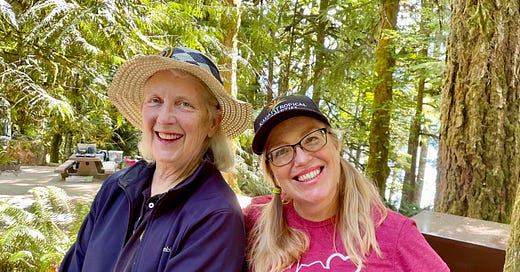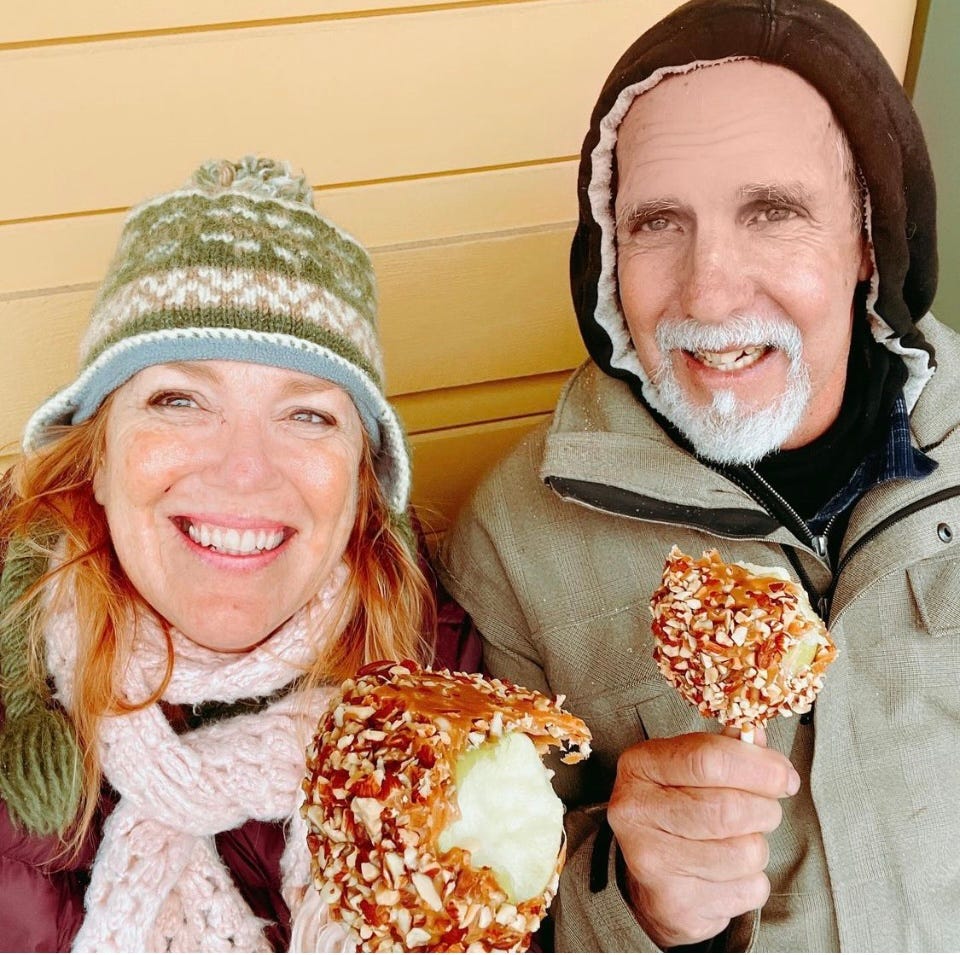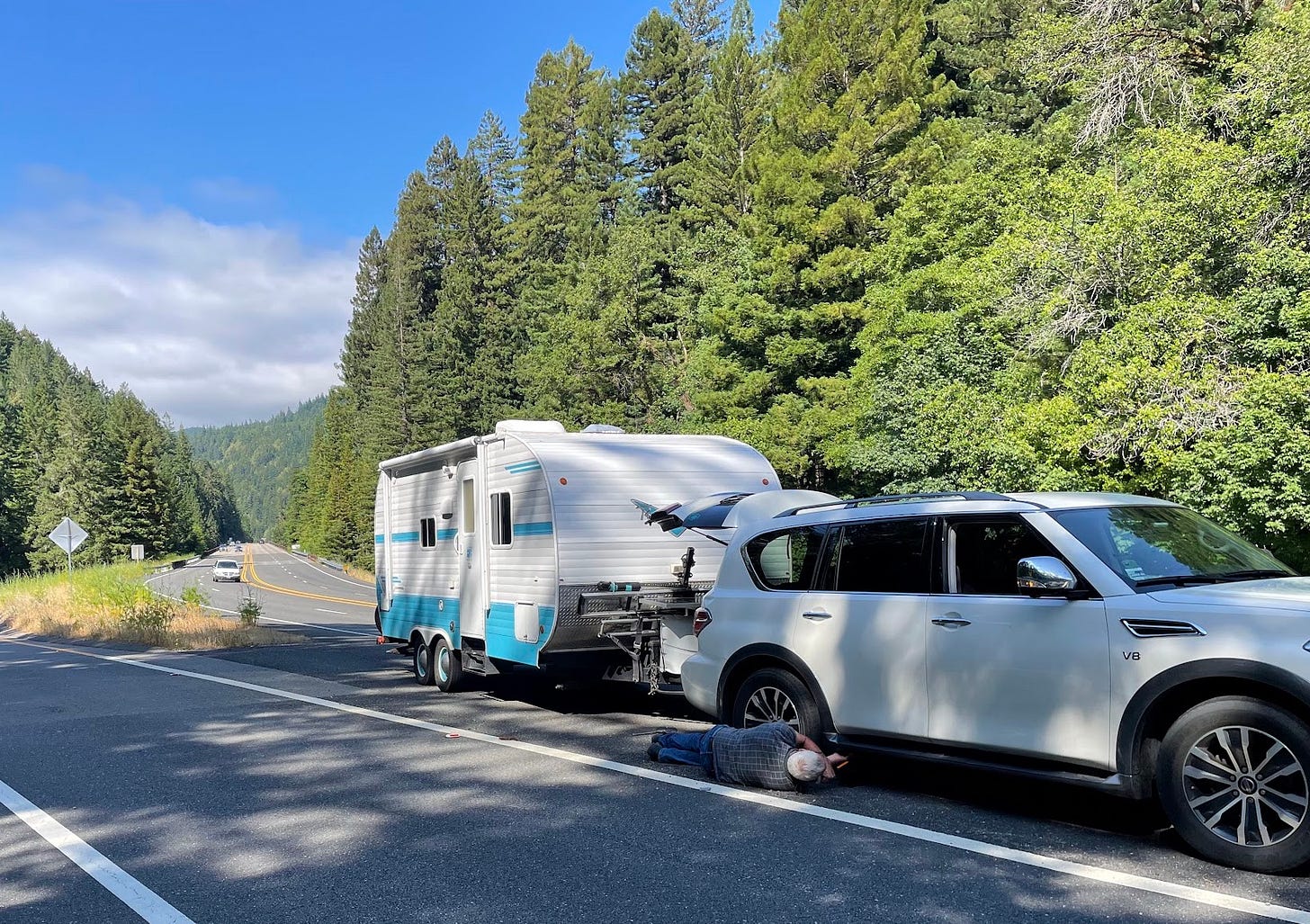The park ranger had clear hazel eyes, no-nonsense gray hair in a bob, and a hat with an official NPS Volunteer badge on the front. She carried a clipboard, and was checking the tags of visitors in the campground we were at.
“Tell me about those bikes,” she said brusquely, pointing with her pen to our e-bikes, leaning dustily against a pine near our rig.
“Oh, we only ride them on designated bike trails,” I stuttered, worried about some wrongdoing.
I was often worried about wrongdoing with the ebikes. Every state defined them differently, and the rules always seemed to be changing.
“No, I want to know how you like your bikes.” Her grin was a sun ray breaking through clouds. “I’m a host at this campground and I need something to get around on. I’m looking into one of those.”
“Oh!” I smiled in relief. “We love them!”
After a brief info-mercial in which I extolled our battery-assist bikes, I told her we were tripping around the country in our trailer, fulfilling a long-held dream (this post is a flashback.) “What brings you to a park as a host?”
“I’ve traveled around the country doing camp hosting every summer for years, but I just sold my house in Seattle as I retire. I’m embarking on a new chapter full time living in my trailer. I’m not sure what’s next for me after this stint at this park.”
“It’s a funny feeling, isn’t it? Both freedom and uncertainty.” I was delighted with the unexpected depth of the conversation.
“Exactly that.” Lynn nodded in her brisk way. “I wanted this, but now I’m nervous.” She gave a short bark of laughter. “Also, my rig is full of boxes because I had to get everything out of the house to sell it. I have no idea what to do with them. Possessions of a lifetime stuck in my trailer.”
“A hazard of emptying out,” I said. “But I love having less stuff.”
“Me too. Turns out you don’t need much.” Lynn suggested several places where we could winter in our trailer should we be so inclined, including famous Quartzsite, Arizona, a mecca for full-time “trailer tramps.”
“Oh no, that’s not our scene. Too many people!” I told her I’d read about Quartzsite in a recent nonfiction book, Nomadland, which does a great job of exposing a whole socioeconomic layer of American RV dwellers perpetually on the move, many of them “workcamping” and living nomadically out of economic necessity.
“Quartzsite is an experience. You’d probably like Yuma better, then,” Lynn suggested.
“I’m writing a book about our travels; it’s called Passages,” I told her. “I was inspired for the title from Gail Sheehy’s book on adult stages. The plan is to write about camping in changing times: climate change, pandemic change, and personal aging change.”
“Sounds interesting. Sheehy’s book was good, but I liked Pathfinders even better,” Lynn said. “Sheehy talked about what makes for resilience. You’d like it.”
We ended up taking a picture together and exchanging hugs and contact information.
I’d met a strong, unique and interesting woman who was committed to a life on the road as a personal lifestyle choice, and I respected the hell out of that.
I’d also made a real connection with someone who’d been a stranger when she walked up to me.
Every time that happens, (and it happens a lot when camping) I’m reminded that the world can be a friendly positive place that responds to the energy and expectations that we project.
The “world of RV’ing” was foreign to Mike and me when we bought our first, tiny Casita trailer.
We don’t have many trailers in Hawaii; individual islands in the Hawaiian chain are too small for RV’ing to be the industry its become on “the Mainland.” Between narrow, rural roads, few public parks with any sort of long term parking (let alone hookups), and the prohibitive cost of shipping a trailer 3,000 miles (and then between islands separated by rough seas) it’s easy to see why such a popular continental activity has never caught on in the 50th state.
Frankly, I hope RV’ing never does catch on in Hawaii. I can’t imagine the traffic snafus!
As we got deeper into the roadtrippin’ life, we discovered so many layers to it.
Our trailer turned out to be our “escape hatch” for the many evacuations we faced in our fire-prone area near Santa Rosa, California. That was NOT what we bought a trailer for, but it sure came in handy to have everything we needed to live indefinitely away from our house when those “run for your lives” alerts went out!
RV’s also provide important long term housing.
Mike’s career in human services while we lived on the Russian River put him in touch with entire communities of low-income elderly living in decrepit trailer parks. Often these pockets of poverty were tucked out of sight behind fences and dressed up with names like “Shady Acres RV Living.” I assisted on a few volunteer workdays with Mike’s agency, and can attest to the heartbreaking need hidden in these broken-down RV parks (not to mention how bad things can get when an RV toilet is never emptied!)
Mike’s experience with hitching up, driving, and parking our rig put him in great demand as a social worker. He worked with a nonprofit to buy older trailers, then moved and set them up as a part of getting houseless folks off the streets. Through this, my eyes were opened to the way trailers, motorhomes, fifth-wheels and other “luxury” travel vehicles can become critically necessary housing for indigent on the secondary market.
And then, there are the full timers, like Lynn was planning to become.
A whole subculture of retired people who continually move around in their RVs from warm zone to temperate zone (and back again) throughout the year exists and thrives in the United States. It's estimated there are over 1 million full-time RVers in the country. Popular destinations include Florida in the winter, and northern states like Montana and Michigan in the summer. Quartzsite, Arizona hosts over 100,000 RVers each January in a huge gathering and swap meet. The RV lifestyle allows retirees freedom and adventure on a budget.
At one point we wondered if that would be for us, too—but we hit a wall and burned out on the road.
We like traveling, but we like coming home just as much.
I am certain we could not have discovered this so clearly without trying to live for months out of a trailer.
Overall, RVing allows people of all walks of life the chance to explore the open road. From retirees seeing the country to those using it as an alternative form of housing, RVs can provide a vehicle for transition.
However, the RV’ing isn't for everyone. The dream life portrayed on social media doesn't match reality for most.
More detail on the realities of RV camping and why it may not suit everyone:
Maintenance and Repairs - RVs are complex vehicles with electrical, plumbing, and appliance systems that require regular upkeep. Things like leaks, generator problems, and RV fridge breakdowns happen, sometimes in inconvenient locations far from repair shops. Not everyone enjoys tinkering with mechanical issues. (Thankfully, Mike is good at this. I can’t tell you how many times he’s been on his back under the trailer tightening or replacing something.)
Driving Challenges - Driving a large RV or towing a trailer is very different from driving a car. They don't accelerate quickly, need wide turns, swing out on curves, and are blown about by passing semis. Backing up takes practice. Finding gas stations to accommodate RVs can be tricky. Changing tires on the road is a huge job. Inclement weather and high winds add difficulty.
Limited Mobility - While RVs provide shelter, they can limit movement once parked. Getting around requires packing up, stowing all belongings, hitching up, and moving the large vehicle. Day trips in the tow car also require unhitching. Some destinations like cities or rugged terrain may be inaccessible.
Lack of Space - RVs max out around 400 square feet for large motorhomes. Storage is at a premium with little room for hobbies, projects, extra clothing or gear. Every item must have its place. Minimalism helps, but the confined quarters can fuel tensions (this is an understatement, HA!)
Isolation - Because RVs are always on the go, it can be hard to establish community connections, friendships, or find a spiritual home. The solitary lifestyle may not suit extroverts who like a lot of friends around them. Some areas limit stays to 2 weeks, inhibiting meaningful bonds.
Hookups - While ideal, full hookups for water, electric, sewer are not guaranteed or frequent. Boondocking (no hookups, everything working and self contained on the trailer or RV) relies on battery power, hauled water, and dumping tanks. This DIY requirement isn't for everyone, and our max without hookups is 3 days! So planning is essential.
Weather issues - Freezing temperatures can damage plumbing and fixtures. Summers in the Southwest may be uncomfortably hot. Storms rock smaller rigs. RVs don't offer insulation or soundproofing like houses.
Other People- Not everyone will be like you, nor will they LIKE YOU. We have camped with people sporting giant Confederate flags who tote guns proudly (not our cuppa, FYI.) We have dealt with noisy partiers and screaming kids. Campgrounds are often unpredictable mixes of all levels of society, and that can be eye-opening, annoying as hell, and also amazing like when we met the incredible Paul and Mary in Olympic National Park and learned to make feather kites.
RV camping is a dramatic change from regular life patterns. The adjustment requires effort. For some, the rewards outweigh the hassles. But recognizing it's not a lifestyle suited for everyone is important.
We moved through three different sizes of trailer before we found “the one” that was perfect for us. Be wary of overcommiting with a big purchase before you know what your patterns will be. Also, test drives of varying lengths can help you avoid expensive and over-optimistic mistakes.
I hope Lynn is loving her commitment to a life on the road—and if she isn’t, that she finds her next place to park and call home. In the end, we all have to do that—and the journey’s the thing, isn’t it? 😄
P.S. Hit the little ❤️ if you enjoyed or learned something from this post, and pass it on, will you? Comments are welcome!







We were full-time RVrs for 21 years - sadly, getting off the road 3 years ago due to health issues. We had 3 different 5th-wheels; our last was 43' long and we pulled it with a big rig. One of the most interesting (and a bit nerve wracking) experiences we had was in Buffalo, NY. We were on an onramp and found, much to our dismay, that at the end of the onramp was a bridge which we would not fit under. So my husband had to back up on the onramp to find a road which would take us to parking for Niagara Falls. I stood outside our rig, waving people over while he backed up. Fortunately, for us, people were very polite & they all pulled over upon seeing the predicament we were in. We've been in all 50 states (all but one in our RV) and definitely miss the lifestyle. Sigh....
I thought, for a while, that I'd love the nomad life, but alas, I've waited too long. About 10-15 years too long! Since I quit working, I've aged at super speed! Maybe just realized I've aged, but whatever. I'll just have to be content with where I am, with what I have and be thankful it's really pretty enjoyable.